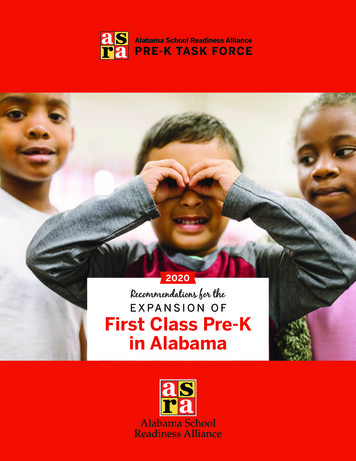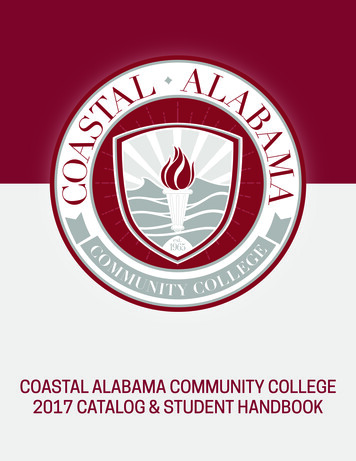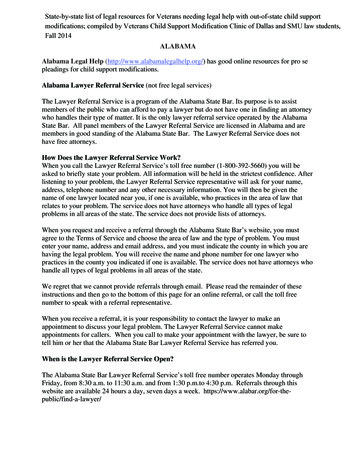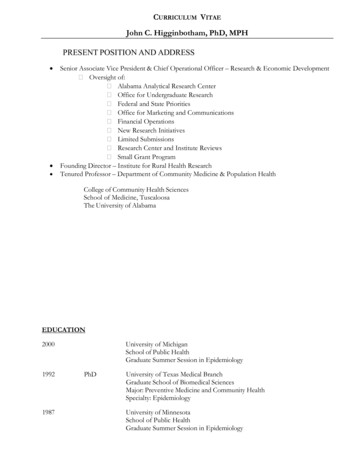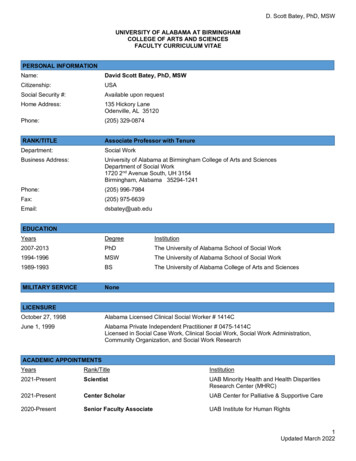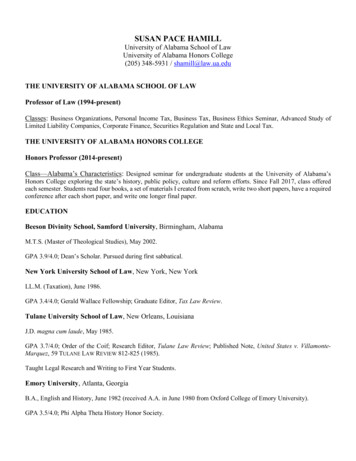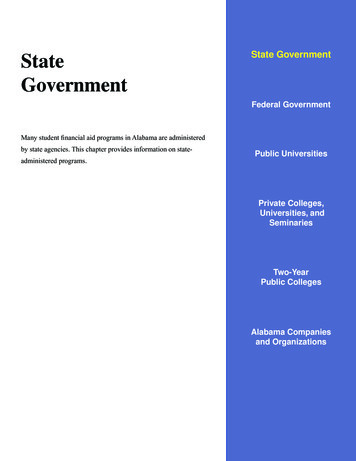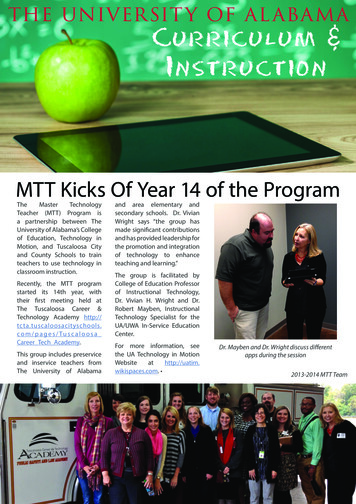
Transcription
the universit y of al abamaCurriculum &InstructionMTT Kicks Of Year 14 of the ProgramTheMasterTechnologyTeacher (MTT) Program isa partnership between TheUniversity of Alabama’s Collegeof Education, Technology inMotion, and Tuscaloosa Cityand County Schools to trainteachers to use technology inclassroom instruction.Recently, the MTT programstarted its 14th year, withtheir first meeting held atThe Tuscaloosa Career &Technology Academy http://tcta.tuscaloosacityschools.c o m / p a g e s / Tu s c a l o o s aCareer Tech Academy.This group includes preserviceand inservice teachers fromThe University of Alabamaand area elementary andsecondary schools. Dr. VivianWright says “the group hasmade significant contributionsand has provided leadership forthe promotion and integrationof technology to enhanceteaching and learning.”The group is facilitated byCollege of Education Professorof Instructional Technology,Dr. Vivian H. Wright and Dr.Robert Mayben, InstructionalTechnology Specialist for theUA/UWA In-Service EducationCenter.For more information, seethe UA Technology in MotionWebsiteathttp://uatim.wikispaces.com. Dr. Mayben and Dr. Wright discuss differentapps during the session2013-2014 MTT Team
Learning Together:A Partnership to Improve Elementary Students’ Literacy Achievement and Teacher Candidates’ Practiceprompting for meaning?”; “Today in word work, I’m goingto see if she can write the wordwe took to fluency yesterday.”; “I think that Jamal is ready tomove out of sound boxes andmove to spelling boxes—hiswriting book shows that hearsalmost every sound—now weneed to focus on what ‘looksright.’”; “Her strength is using meaningto solve unknown words, but sheis ignoring the structure—I needto find an engaging book that ispatterned for my lesson today.”; “Portia is consistently reading aLevel 6 book between 95-98%--Ineed to move her up.”Dr. Henderson and Mrs. CrawfordIt is 7:30 in the morning and theteacher candidates’ parking lot atHolt Elementary School is nearly full.Upon entering the professionalclassroom, established in 2012by Dr. Shannon Henderson inpartnership with the principal,Mrs. Debbie Crawford, you willsee teacher candidates studyingtheir assessment data and selectingbooks for the upcoming lesson withtheir struggling kindergarten or firstgrade literacy learner.Snippets of conversations bubbleup from tables and in small groupsselecting books from classroomlibrary: “He’s using visual informationto solve unknown words, buthe is ignoring meaning—haveyou used a book that is good forThis is no ordinary “Introduction toReading” methods class. The teachercandidates in Dr. Henderson’ssection of CRD 369 tutor a strugglingkindergarten or first grade literacylearner for 30 minutes, two days perweek; concomitantly learning aboutliteracy processing theory and howto apply those understandings to theteaching of reading and writing.Based on thework of scientistandliteracyresearcher,Dr.Marie Clay, teachercandidatesuse a modifiedlesson framework from the ReadingRecovery intervention program asthey learn how to assess students’strengths and identify what theirstudents “need to be able to learnhow to do next” to accelerate theirliteracy development. At the endof the semester, teacher candidatesprepare and submit a clinical reportthat highlights student progressand recommendations for futureinstruction that is shared with theprincipal, classroom teacher, andparents.While class is officially scheduledfrom8:00-9:30,UAteachercandidates arrive at 7:30 and oftenremain on site until 10 or 10:30 asthey problem-solve and plan forupcoming lessons--evidencing theirdedication and commitment to theirelementary students, teaching, andthe teaching profession.
UA Hosts 2014 RegionalScience OlympiadThisyear’sAlabamaScience“Experimental design is aplanned activity designedto understand the naturalorder of events in nature.”Olympiad at the University ofAlabama was scheduled for Saturday,February 22, 2014, 9:00 am to 2:00pm. The College of Education SCTLDr. DennisSunalProfessor,SecondaryScienceEducation-Dr. Dennis SunalScience Education Faculty, GRAs,and Students (SciTeach) and theColeman; and faculty Dennis SunalOffice of Research on Teaching infocus[SCTL] designed, administered, andthe Disciplines (ORTD) sponsor thescience clubs and after schooljudged the event.activities as students prepare forExperimental Design Event, one ofOlympiad events, making it a socialseveral others that day. The SCTLscience education faculty has beenExperimental design is a plannedsponsoring this event in the Scienceactivity designed to understand theOlympiad for over 10 years, for bothnatural order of events in nature.middle and high school divisionThe researcher does somethingteams.more than just carefully observingwhat is occurring. The importanceofexperimentaldesignstemsThis year the event included 15from the quest for understandingmiddle and 15 high school teams,causes or relationships as opposed90 secondary science students,to simply description. The purposefrom south central to northernof the design is to rule out theseAlabama participated in the annualalternative causes, leaving only thecompetition.hypothesized factor that is the mostTheExperimentalDesign Event took place in thelikely real cause.science education lab in 3408 SECBldg. Graduate teaching assistants,Mire,Science Olympiad offers studentsMichelle Wooten, and Tara Ray; SCTLexperiences with science outsidestudents Rocky Elmore and Johnof the classroom that often are aMarilynStephens,Abbyofexperience as well as an academicone.ParticipationinScienceOlympiad events and tournaments,in turn, attracts more students toprofessional and technical careersin science, technology, and scienceteaching. Dr. Dennis Sunal, whoworks with the experimental designsection of Science Olympiad at UA,notes, “Even when students do notpursue science careers, they becomecitizens more able to think throughthe science-related problems we alldeal with in daily life through theOlympiad experience.”
Elementary Education:Undergraduate Students Conduct Action ResearchDrs. Lisa Fowler and Lee FreemanEach semester, Elementary Education Practicum III(CEE 496) instructors, Drs. Lisa Fowler and Lee Freeman,provide students with a unique opportunity to conductaction research.Students are guided through the process of forming aresearch question centered upon some concern theyhave identified during their semester III placement.Once the question is formed, students learn how to writean Introduction to their action research study. The preservice teachers then conduct extensive review of currentliterature seeking to identify solutions to the question.They are taught how to write a Review of Literature in APAformat.Once the literature review is complete, students forma Plan of Action in an attempt to answer their actionresearch questions. The procedures used vary, basedupon the nature of the question. Cooperating teachershave input into this process, as well. Students create aplan for action research that will last at least 10 days.As the students carry out the Plan of Action, data arecollected. Next, an in-depth analysis occurs with facultyguidance. All of this information is formally writtenand accompanied by data charts and graphs to providestudents more experience in gaining meaning from data.This project has proven to be a valuable experiencefor students. When their formal paper, complete withconcluding paragraph and references, is finished,students present their work. Action Research PresentationDay is a “big deal”. Students dress professionally, preparebrochures, and present their findings to semester II (CEE495) students.The presentations serve two purposes. First, they area forum providing students with a means to share theinformation they have gathered and the conclusions theyhave made. Second, semester II students preview therequirements for the upcoming semester. After readingfinal drafts of the action research papers, and watchingpresentations, Drs. Fowler and Freeman identify at leasttwo students who demonstrated outstanding studies.During the fall semester, Amanda Cramer and MarissaMurphy were identified as having conducted a highquality of research.The action research papers describing their work weresent to the Office of Research in the Teaching Disciplines(ORTD). The ORTD published the papers and extendedan invitation for both students to attend a researchseminar for undergraduates in spring 2013. The papersare available at http://education.ua.edu/centers/ortd/ugresearch/.
COE Alumni ShowcaseGlenda OgletreeMoreover, she was selected as a member of the NBPTS ELASince graduating in December 2007 with a doctorate inCurriculum & Instruction and Elementary Science, GlendaOgletree has been teaching at Armstrong Atlantic StateUniversity in Savannah, Ga. As an Assistant Professorin the department of Childhood and ExceptionalStudent Education, she teachesthe undergraduate and graduatescience methods’ courses alongwith other preparatory courses.She is also currently working witha pilot group of internship studentson the edTPA portfolio process. Shesponsors the Nu Zeta Chapter ofKappa Delta Pi. They have an activegroup of students and graduates that participate in manycommunity service activities including a yearly LiteracyAlive project at a local school’s Twenty-First Century afterschool program.Her dissertation dealt with teacherscience pedagogical content knowledge and its positiveimpact on student learning. The dissertation has beencited numerous times in the literature and several studieshave followed up research methods developed while atUA. During the past six years, she has presented at local,state, and national conferences and she has a recentarticle in KDP’s New Teacher Advocate journal.Emily SimsStandards Committee. This committee was comprisedof educators from around the United States and wascharged with revising current and developing new ELAstandards for future National Board candidates. In 2012,Sims was elected to a four-year term on the JacksonvilleCity Schools Board of Education. She has presentedat national, state, and local conferences and servedon various national, state, and local committees. Herresearch interests involve using emerging technologiesto improve student achievement and to increase studentengagement.April NelmsApril Nelms (Ed.S. & Ph.D., 2012) is an assistant professorand science education coordinator in the Departmentof Teacher Education at theUniversity of North Georgia (UNG).In her role as assistant professor,April teaches science ,middle,and secondary levels; in in-serviceteacher professional developmentcommunities; and in an onlinegraduate program in middle grades math and science. Asscience education coordinator, she manages scheduling,budgets, personnel, and faculty evaluations. With theEmily Sims, a 2012 Ph.D. graduate, is an Assistant Professorin the Department of Secondary Education at JacksonvilleState University.In addition toserving as Undergraduate ProgramChair, her course load entailsELA and literacy undergraduateand graduate courses. She alsosupervises ELA teacher candidatesin field experiences. In May 2013,Sims achieved National Board ofProfessional Teaching Standards(NBPTS) renewal status in ELA.rural, residential setting of UNG in close proximity toAtlanta, April is pursuing her research interests in inquiryscience instruction and teacher knowledge developmentin rural, impoverished areas and suburban areas. Shecontinues to pursue national grants to advance herresearch and obtained two in-house grants for programdevelopment. April also facilitates student teachingexperiences for education majors in partnership withuniversities in Germany and China and is planning aninquiry immersion experience in New Zealand.
Hannah GerberHannah R. Gerber graduatedfrom The University of Alabamain December 2008withher Ph.D. in Curriculum &Instruction, Secondary EnglishEducation. She is Assistantprofessor at Sam Houston StateUniversity. Hannah is interestedin the impact that variousmedia and technologies haveon culture, broadly focused on the impact on learningand socialization across cultures and societies throughtransnational flows and responses. Her immediate focus ison the impact these digital spaces have on learners withinpublic school systems, with an interest in both urban andrural schools systems. Since arriving at Sam HoustonState University, she has proposed five new graduate/doctoral level classes including Digital Epistemologies,Digital Literacies & Pedagogy, Digital Literacies & Policy,Popular Culture, Virtual Worlds & Literacy, and VirtualEthnography. She is in the process of proposing a newmaster’s program as a Master’s of Digital Epistemologiesand Literacies. She is involved in international outreach inEgypt and across the North Africa region and has helpedspearhead (with an Egyptian NGO-AIM) the developmentof a program to work with public school teachers in Egyptpost-revolution. Hannah serves as the current chair ofthe National Council of Teacher of English Conferenceon English Education (NCTE/CEE)Commission onNew Literacies, Technologies, and Teacher Educationand is chair of NCTE’s newly established Collaborativeon Contemporary Literacies, Popular Culture, and Outof- School Spaces. Hannah also serves as co-editor ofthe book series, Gaming Ecologies & Pedagogies (SensePublishers) along with Sandra S. Abrams.Amanda GlazeCongratulations to Dr. Amanda Glaze who won 1st place inthe Science Education Divisionfor her research paper FactorsInfluencing Acceptance andRejection,” at the 2014 AlabamaAcademy of Sciences papercompetition. Dr. Glaze, receivedher doctorate in December, 2014from the College of Education atThe University of Alabama and is currently teaching atJacksonville State University. Under the guidance of Dr.M. Jenice Goldston, her research paper which was basedupon data collected during her dissertation focused onpreservice secondary science teachers’ acceptance andrejection of evolution. Dr. Glaze, Dr. Goldston and Dr. JohnDantzler have recently co-authored an accepted paperfrom this work in the International Journal of Scienceand Mathematics Education. Another co-authored paperfrom her work is under review in the Journal of ScienceEducation and she has been asked by an editor to submit aproposal for a book based on qualitative research findingsfrom the preservice teachers in her dissertation work.Martha Poole SimmonsSince Martha’s retirementafter teaching for 32 yearsin elementary schoolsand at the university levelat AL State University,Huntingdon College andBelmont University, Dr.Martha Poole Simmonswho received her B.S. in1959 and Ph.D. in 1980in Elementary Educationcontinues to provideservice to others throughhercommitmentas a volunteer inMontgomery, AL and the nation. The AL A.A.R.P. and theCentral AL District American Red Cross selected her as therecipient of the 2013 Volunteer of the Year Awards becauseof her service in disaster relief and at hospitals, communitysenior centers and churches. She provides leadershipand facilitates action and organization within groups.Martha Poole led volunteers in raising over 108,000 torenovate Montgomery’s Crump Senior Center, and sheserves as a presenter at civic and church groups providinginformation on disaster relief preparedness.MarthaPoole enjoys swimming and playing doubles tennis andhas won 60 medals in the AL Senior Olympics. On April 10,2014, the HandsOn River Region and the Junior Leagueof Montgomery, AL, presented Dr. Simmons with theLifetime Achievement Award, for her volunteer activitiesover time. The HandsOn River Region partners with over200 non-profit, faith-based and government organizationsto recruit and connect volunteers in a coordinated way tocreate the biggest impact for positive change.
English Language Arts Student ReceivesInternational Exchange Alumni AwardAaron Brazelton, Secondary English Language ArtsEducation major, received the International ExchangeAlumni Award for the month of February 2014. Theaward is given by the U.S. State Department Bureau ofEducational and Cultural Affairs, Alumni Affairs division.The honor is given to one exchange alumnus – of morethan one million across the United States – each month.He has been honored for spearheading the creation of TheSerbia Fellowship Experience, an educational and socialpartnership between Honors College, the Universityof Novi Sad and the municipality of Blace, Serbia. TheExperience involves students in working closely withSerbian youth, creating and implementing plans to betterequality both in Serbia and in the USA. The collaborativeis the first student-led initiative in Serbia, which BrazeltonStudents Meet Children’s Author,Lester Laminack, at the AlabamaReading Association ConferenceOn November 15 and 16, 2013, eighteen students inCEE 370-001 attended the Alabama Reading Association (ARA) conference in Mobile, with Dr. ShannonHenderson. For three days, the teacher candidatesattended sessions devoted to furthering their understanding and ability to teach reading and writing toelementary school students. The teacher candidatesalso had the opportunity to meet and participatein sessions with renowned children’s author LesterLaminack.first visited as a high school exchange student. Thepartnership is funded by the UA College of Education,Division of Student Affairs, and Honors College. Brazeltonnotes “they all help develop us into leaders who’ll impactcommunities across the world. I’m so glad I decided tocome to UA.”The Fellowship Experience group had its first trip toSerbia in 2013, when it helped implement anti-bullyingcurriculum from the Heritage panel, a program startedby the YMCA. Brazelton helped start a UA branch of theHeritage Panel. The curriculum “addresses the negativebehaviors of bullying, cliques and exclusion” according toBrazelton.
Consortium for Overseas Student Teaching:M a k i n g a D i f fe r e n c eThe Consortium for Overseas Student Teaching (COST)is a voluntary pact of mutual understanding among agroup of colleges and universities acting through theirschools, colleges, or departments of education to provideopportunities for quality student teaching placementand supervision in a setting outside the United States.In this newsletter, we hear from four students who haveparticipated in the COST program: Brittany Johnston,Jessica Steele, Lindsey Brown, and Abby Alexander.Brittany JohnstonMy name is BrittanyJohnston and I’m a 2009graduate of the Universityof Alabama. I am currentlystudying for a M.Edin Learning, Diversity,and Urban Studies atVanderbiltUniversity,Peabody College. Upongraduating in July 2014, Iam moving to Siem Reap,Cambodia. I have accepted my first full-time teachingposition as a Kindergarten teacher at Jay Pritzker Academy.During the Spring 2013 semester, I was fortunate to teachin New Zealand through the COST Program, an experiencethat offered immense personal and professional growth.Wanting international experience prior to applying toCOST, I searched the seemingly endless opportunities.This landed me in Costa Rica for a 10-day volunteerexperience with Magnificat Travel in December 2010,and in South Africa for a 3-month volunteer-teachingassignment during Summer 2012.I probably would not be where I am today had COST notbeen affiliated with the University of Alabama. I may nothave been as eager to volunteer abroad, I may not havebeen accepted to the graduate schools of my choice, andI almost certainly would not have received a job offerthrough International School Services without teachingexperience. I am grateful for the COST Program, as itwas and continues to be influential in guiding me in mypersonal, educational, and professional aspirations.Jessica SteeleMy name is Jessica Steele and I was a part of the COSTProgram in 2009. The COST Program was an amazingopportunity, which I grabbed with both hands. I owea deep debt of gratitude to Dr. Freeman, of the UACollege of Education,for recommending theprogram to me. For myplacement, I travelledto Port Elizabeth, SouthAfrica where I spent thesemester working in aGrade R and Grade 6classroom at CollegiateJunior School. Collegiateis a private, all girls JuniorSchool (Grades R-7) and
High School (Grades 8-12). South Africa’s school systemis radically different to that of the United States in thatschools have very little government funding or followthrough support; therefore, the parents’ required schoolfees fund many institutions privately.This experience opened my eyes to the struggles still rifein South Africa since the apartheid era and the need fora radical shift in the educational pedagogy. Educationis provided for all, but the quality of education is solelydependent upon your financial standing and beyondthat, few teachers are trained or equipped to teachstudents with special needs. This has resulted in thecreation of special schools, which exclude learners withlearning and physical disabilities from their generaleducation peers.My experience in South Africa opened my eyes anddeepened my passion for quality educational provisionfor those who need it most. After my internship I returnedto the states emblazed with the goal of returning to SouthAfrica to do my part. The COST Program equipped mewith the confidence and provided me the opportunity tobe a part of the change. I spent a year teaching Grade 6 inthe states before returning to South Africa. After teachingat a special needs school and serving as a member ofthe school’s governing body and school managementteam, educating my colleagues on current educationalpedagogy, I was presented the opportunity to join aneducational non-profit called Ubuntu Education Fund.At Ubuntu I serve as the Mentor Teacher, where I focusmy energies on strategic development, curriculumdesign and empowering educators from the township,through professional development, to equip the youngscholars we work with, from our Early ChildhoodProgramme right through to the Adults with the skills,knowledge and confidence required to be successful inthe world of work and ultimately stabilize their families. Ican honestly say, without the COST Program I could havenever achieved my dream of working in the developmentworld to provide quality education to all.Last, but certainly not least thanks to my experience inCOST experience in South Africa, I met and married mybest friend! Pretty important detail, don’t you think?Lindsey BrownI can still remember finding the one COST programbrochure in the Clinical Experiences office, laidhaphazardly on the shelf. At that moment I was intriguedbut never thought, this would be a life changing moment.Questions flooded my brain “How could I afford a triplike this? Could Imake it out thereon my own?Could I be awayfrom my familythat long? Howwould this affectgraduation? Howwould this affectme finding a job?”After many longdiscussionswithYolandaEubanks, ClinicalExperiencesadvisor, mentor,and friend, Ibegan to thinktraveling overseasto complete mystudent teachingjust might be an option. I learned that there were manyscholarships to help fund my trip and I could makechoices on what country I would like to go to. I could alsolive with a family in my designated county. In addition,I could complete my degree, graduate early and beginsearching for jobs sooner. Too good to be true? Thiswas the immediate question from both myself and myparents. The answer, no. It was not too good to be true.This adventure was within my grasp.Mounds of essays, background checks, and visaapplications later, I was given the news that wouldchange my life. I would be completing my studentteaching in Geelong, Australia. I would be living with theMcCoy family. I would be traveling with my wonderfulfriend and classmate Holly Simpson. I also had receivedscholarships to help pay for the trip. I was elated,nervous, and scared. Prior to this trip, I had never beenon an airplane and I had never been outside the country.On May 25, 2008 I packed my bags, said a tearful goodbye to my family and travelled across the world to mynew home.During the eighteen hour flight, there was a lot of timeto think. I wondered who this family was. What are theylike? Will they like me? Will I like them? Will it be strangeand awkward living in their house? My questions wereall answered when my “Mum”, Kay picked us up from theairport with happy face balloons and great big hugs. Iarrived at my new home to find a house full of peopleand animals. Emily, Mitch, and Holly were my new
siblings and Bruce my Dad. There were cows, horses, cats,dogs, chickens, birds, hermit crabs, and fish and the homewas filled with more love that I could have ever hoped for.This loving family took me on trips to show me the sightsof their country, helped me plan my trip to Bali, Indonesia,gave me a graduation party and always made me feel athome.I cannot express how grateful I am for the McCoy family.How do you thank someone for opening their home andtheir hearts to you so freely? I guess you invite them toAmerica! After departing Australia in September of 2008,the McCoy family began planning their trip to Americato spend Christmas of 2009 with me and my family. Itwas the greatest experience to have both of my familiesthat love me so dearly, together. Since then, the McCoyfamily have been to the states twice and we have traveledtogether to Disney World both times. In 2013, the McCoyfamily opened their hearts and their home again to meand my husband. As a wedding gift, the McCoy familygave us plane tickets, a place to live, and found us jobsin Geelong, Australia. After many sleepless nights, myhusband and I decided to quit our jobs to grab hold of thiswonderful opportunity that was given to us. We arrivedin Geelong on October 22, 2013 and we are currentlyliving with the precious McCoy family. I never would havethought I would be back here, typing this article from ourhome computer in Geelong, Australia.The COST program changed my life. It forced me to “getout of my comfort zone.” It allowed me to find a differentside to myself. I found that I am courageous, brave,unpredictable, and adventurous. When I began lookingfor jobs, I found that these attributes, given to me throughmy COST experience, came in handy. Prior to my COSTexperience, I was rigid, predictable, a rule follower, andin constant need of routine. After interviewing for manyteaching positions, I took time to really ask myself what Iwanted to do with my life. I remember thinking “what ismy calling?” My new found courage allowed me to makethe next greatest decision of my life. I found that teachingstudents with special needs was my calling, what I wantedto do with my life.Since 2009, I have received a Master’s Degree in Counselingfrom the University of West Alabama. I also becamea special education teacher at New Hope Elementaryfor two years. I then moved on to become the AutismResource teacher at Beaverdale Elementary School. I amcurrently an Applied Behavior Analysis (ABA) Therapist forstudents with autism in Geelong, Australia.The COST program changed my life forever. It gave methe opportunity to explore another country, learn newand innovative teaching techniques, and brought metogether with my Australian family, the McCoys. I amso blessed to have had this opportunity and encourageothers to take the risk. Take a leap of faith.“If it doesn’tchallenge you, it doesn’t change you.”Abby AlexanderMy name is Abby Alexander. I am originally from Tallassee,Al. I graduated from The University of Alabama in the Fallof 2012. I completed my last semester of college abroadin New Zealand. I traveled and studied under the COSTProgram. It was the best decision I have ever made. I neverbelieved I would be able to afford an opportunity likestudying abroad since I was paying for my own college.I used financial aid and worked to save for a year in orderto fund my journey. I made amazing friends that I am stillin contact with for over a year now. I gained a new familythat I am very close to. I have been back to visit twicesince I left in November 2012. I now work as a governessor private teacher in the Outback of Australia currently. Ihave been here for 18 months and have made even morefriends. I would never have had the courage to take ona career like this if it wasn’t for the COST Program. I planto stay here for the next year and I am most certain I willhave many more job opportunities after this experienceand the experience I gained in New Zealand. I have seenso much of the world and can’t wait to see so much more.I was afraid to leave the safety of college, but throughCOST I was able to leave in a structured manner, whichmade me feel safer. After traveling in New Zealand I hadthe courage to go out on my own. I have grown so muchas a person just from this program.
the universit y of al abamaFaculty ContactsCynthia Sunal, Department Head &Professor, Social Studies EducationLatrise Johnson, Assistant Professor,Secondary English Language ArtsTracy Weston, Assistant Professor,Mathematics EducationJulianne Coleman, AssociateProfessor, Literacy EducationStefanie Livers, Assistant Professor,Elementary MathematicsLiza Wilson, Professor, SecondarySocial Science EducationMelissa Fowler, Clinical AssistantProfessor, Elementary EducationMiguel Mantero, Professor,Educational LinguisticsVivian Wright, Professor, TechnologyEducationLee Freeman, Clinical AssociateProfessor, Literacy EducationLisa Matherson, Clinical AssistantProfessor, Secondary Social ScienceEducationJeremy Zelkowski, AssistantProfessor, Mathematics EducationDee Goldston, Professor, ScienceEducationShannon Henderson, AssistantProfessor, Literacy EducationCalli Holaway, Assistant Professor,Mathematics EducationJanie Hubbard, Assistant Professor,Elementary Social Studies EducationChris Inman, Clinical AssistantProfessor, Secondary Social ScienceEducationCharlotte Mundy, AssistantProfessor,
The Master Technology Teacher (MTT) Program is a partnership between The University of Alabama's College of Education, Technology in Motion, and Tuscaloosa City and County Schools to train teachers to use technology in classroom instruction. Recently, the MTT program started its 14th year, with their first meeting held at The Tuscaloosa Career &


